Search Engine Optimization (SEO)
Ultimate Guide
At WorldLight Media, the most frequently asked question we hear is; "How do I get on the first page for Google search results?" While there is no simple answer, and the level of complexity will vary based on your industry and desired keywords, top SEO Rankings are achievable.
SEO, or Search Engine Optimization has evolved and changed a lot over the years, and it continues to change. What works today, might not work tomorrow. We've been helping companies rank highly for over a decade. Below are the most frequently asked questions regarding SEO and some tried and true tips.
SEO FAQ
Click on the links below to jump to frequently asked SEO questions:
SEO Technical Tips
Click on the links below to jump to specific SEO Tips:
9. Books
10. Related Searches
11. Tweets
12. Search Suggest
13. Sitelinks
14. Section Sitelinks
15. In-Depth Articles
16. Carousels/ Link Results

How do I rank on top of Google Search Results?
Search Engine Optimization is really the key to organic search engine rankings. SEO is not cut and dry. Google consistently changes and improves search algorithms, so often things that have worked in the past may no longer work. Ultimately, the number one factor Google considers isn't going to change. That's providing great content. While their actual algorithm is top secret, they do provide advice to people like us on what they are looking for. Here's what they tell us:
1. Great User Experience - Engaging content that is relevant to search words and solves the user's intent is most important.
2. Well-coded, and highly optimized websites. - Websites that are optimized for mobile always get preference. For more information about this, Check out our blog post about quick technical fixes that help SEO.
3. Get reputable sites to link to yours - Google states that links help their crawlers link to yours. The best places to start for link referrals are social media sites, consumer rating sites. Be aware that spammy links don't work, and could actually hurt your rankings, so avoid black hat linking techniques.
To learn more about this topic, check out:

Put simply, a Pillar Page is one page of content on your website that is focused on a core topic for your business or organization. Every business has one or more topics that are considered essentially relevant to who they are and what they do. These giant “pillars” are far more important than other, less important or less relevant topics, therefore they deserve a more substantial concentration of content than other topics. When done well, a strategic SEO Pillar Page will be the backbone of your SEO strategy. Learn more here.

What is a Topic Cluster?
Once your website has a Pillar Page, the next step is to add more detailed content that relates to that Pillar Page's topic. As you go into more depth about the topic, you find more sub-topics that relate to your broad topic. The content should include blog posts, knowledge base articles, images, videos, and more. This is what we call a topic cluster.
A topic cluster organizes related content and links it together. This helps your customer find the information that’s relevant to what they need, and it also shows Google that you know a lot about the subject, and is the key to any great inbound marketing strategy.

How do I build an SEO Pillar Page?
People are talking about SEO, and odds are that by now you have heard about the wonders an SEO Pillar Page can do for your ranking. The reason SEO Pillar Pages are so popular is because, frankly, they are proven to work. By taking the best parts of what matters to readers and what matters to the Google Algorithm, you can create content that is particularly effective in ranking on the top of Google, even for very competitive keywords. We’ll show you exactly how to build an SEO Pillar Page so you can make this powerful tool a key part of your search engine optimization strategy.
For more detailed information, check out, "How do I structure my site for SEO"?
Update: We have more content coming soon that will provide a Step by Step guide on how to properly build a Pillar Page. If you'd like to get notified when we publish this content, please subscribe to content updates here.
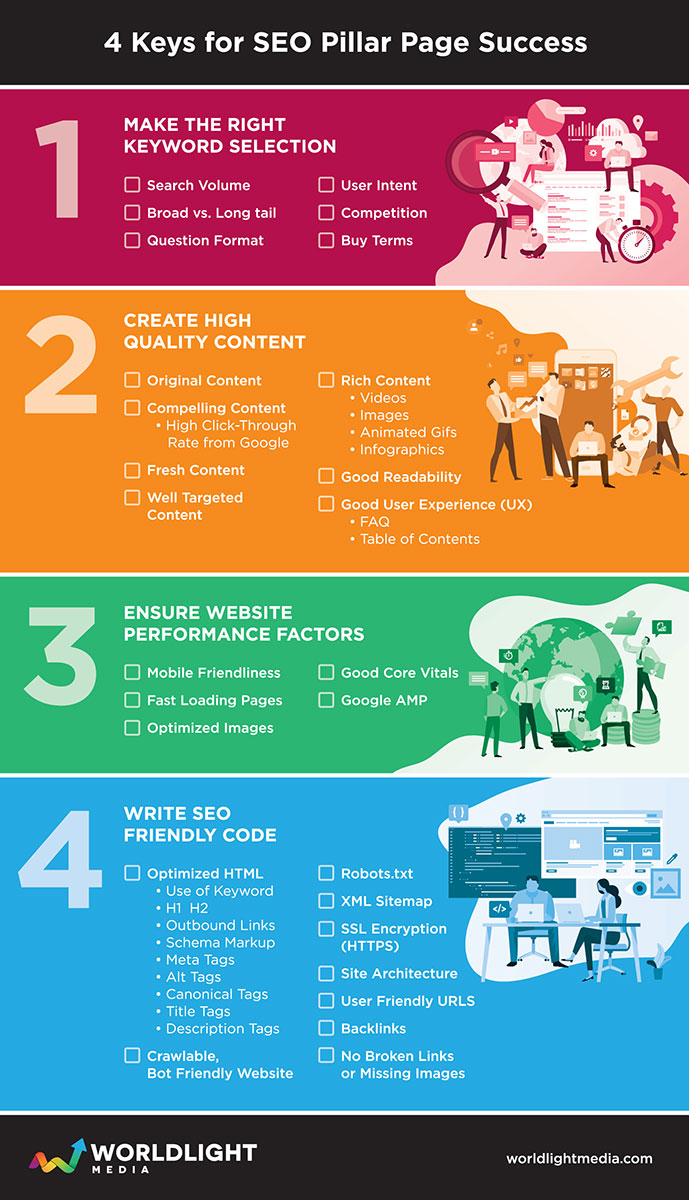

How much does it cost to be at the top of a Google search?
The most accurate answer is, it depends! If you're a skilled blogger/ content writer who has a solid understanding of best SEO practices, and you have time to write a lot of great content, then it may cost you nothing. However, if you don't have the time or the understanding, you will inevitably need to hire some help.
In areas of highly competitive keywords, there will be multiple factors that drive top search engine results. First and most important, will be who has the most helpful and quality content. Other factors will include the amount of content, how frequently the content is updated, and how well the website is coded.
All those factors considered, it often matters more who you're competing against, and the amount of quality content they are already producing. If you want to outrank them, you will have to do better than they do... and we really can't stress enough that doing better doesn't necessarily mean doing more. It's most important that your website content is helpful, relevant, and actually engaging to your users.
One thing to keep in mind is just because a competitor is spending more on SEO Services, doesn't mean that they will automatically outrank you. Having the right strategic partner who understands what it takes and has the skills to help get you there can make all the difference.
Many firms charge flat-rate monthly pricing to conduct SEO Services. Those prices could be as little as $500 per month and can go up to tens of thousands per month. We use a value-based pricing model, and our monthly packages start at $1,250 per month. A one-time project with us starts at $5,000.

How do I choose an SEO Company?
When choosing an agency to help with your SEO, it's important to shop around and do your research. Here are some factors to consider when interviewing potential candidates:
- Make sure you understand their approach - Ask them what it is that they actually do to improve your SEO rankings. If they talk fast and use a lot of jargon you don't understand, they might just be trying to confuse you. Don't be afraid to ask questions.
For example, if a company says they're going to "optimize keyword phrases", make sure to ask them what exactly they do to optimize them. - Research their approach and make sure that it's best practices. - Some agencies use old tactics and are based on myths that are less effective than they once were. Some of these tactics can actually negatively impact your rankings instead of help them.
A solid SEO plan should include more than just backlinking. Make sure that it includes great content, and lots of it, on a consistent basis.
For more warning signs, check out Entrepreneur's article on 9 Signs that you need to fire your SEO Company. - Find out what's included in the monthly fee. - If the fee seems low, it probably doesn't include much. Keep in mind that reports or dashboards, though listed as a service are actually just automatically generated data from software. This type of data can tell you how you're ranking but doesn't do anything to improve your ranking.
Ask the SEO Agency if they will provide a detailed list of the work they do every month. If they are actively working on your site they should be happy to provide you with a list of work completed on a consistent basis. - Don't forget to ask for case studies and references. - A company that gets results will have the data to prove it. Ask them for names of clients they work with. Ask them about the keywords they're ranking for and research your work yourself.
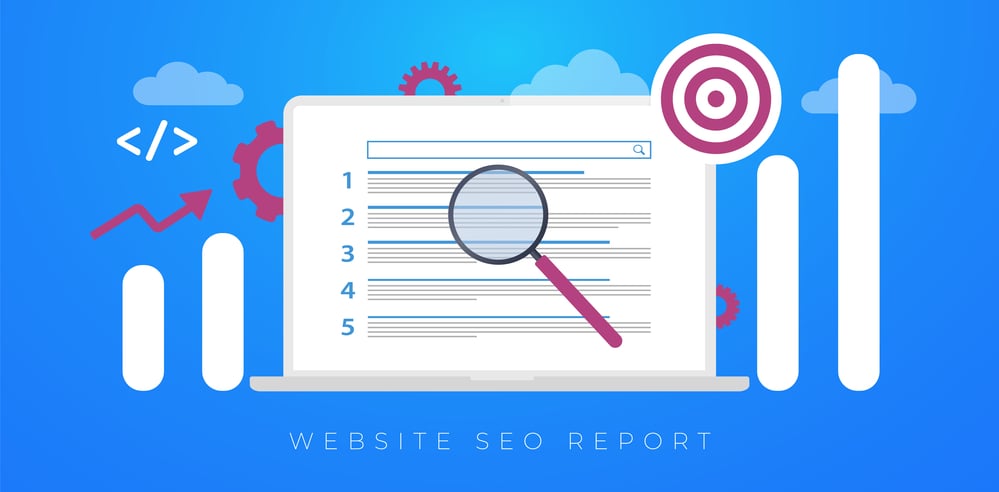
Is it important to appear on the first page of Google Search?
Over the last two decades, we've met a handful of companies who are perfectly happy not having a website or being found by Google. Companies like this rely completely on word of mouth for their business. They might also offer trade-industry-specific services and aren't interested in growth.
For the rest of us, SEO Rankings are crucial. When we want to research or learn something, find a product or service, the majority of the known world turns to Google. Statcounter reported that 86% of search engine queries happen on Google for desktop users. And 94.88% of Mobile users search using Google.
On top of that, 75% of google search queries ended on the first page. What that means if you want to be found by consumers, your best chance is to:
1. Rank in the top 10 of organic search results in order to be on the first page.
2. Pay for Adwords to show up above organic search results.
3. Show up in Featured Snippets such as local Google Maps results.
While there are other forms of advertising, such as social media, television, and mailers. But this type of advertising is more passive, meaning that people may or may not be in need of your product or service.
The most bang for your advertising bucks is getting on the first page of Google because it will connect you with people who are actively looking for what you have to offer. To find out more about how to do this, check out this blog post.
You can find more statistics about the importance of showing on the first page of Google here.
Can you do SEO for free?
Google's guide to a Google-friendly site says that you shouldn't feel obligated to purchase a search engine optimization service, and they suggest that it may not be needed. Ultimately, you do need some knowledge, skills and time to do effect SEO Optimization for free:
1. Good Writing Skills - As mentioned earlier, Great content is king. Your content doesn't need to be written beautifully, but it should be easy to understand and engaging.
2. Solid Web Development/ Coding Skills - Code is so important, and Google has indicated that they will continue to show preference to websites that are coded logically and simply, and easy for their crawlers.
While using free or low-cost CMS services like WIX will help you create a website without web development skills, It may not help with SEO. Many of these platforms are built with a lot of code in order to make page builders work. Even WordPress sites, that have traditionally performed well with SEO, are no longer ranking as well as they used to. One of the reasons for this is the new page builders, plug-ins, and themes that are all used. They can create messy code, and Google has been penalizing sites for this.
3. Time and consistency - Great SEO not only requires great content and great code but the quantity and consistency of your content matters too. Before deciding to do SEO yourself, make sure that you understand the commitment required, and that you can stick with it over a long period of time in order to stay on top.

What Factors Contribute to Good SEO?
The most important factors that Google prioritizes are as follows:
- Content (Unique, Thoughtful, Quality Content)
- Links pointing to your site (Trust and Authority)
- Rankbrain (UX + searcher intent, page loading speed, CTR)
- Technical Factors (HTTPS, H1, H2, Titles, Meta, Structured Data, XML sitemaps and robots.txt)
The most important pieces of information to pay attention to are the Search Ranking Factors.
Which SEO blogs should I follow?
Know who are the major players in the SEO world and check out their content.
Here are the top 3:
- Search Engine Journal - searchenginejournal.com
- Search Engine Watch - searchenginewatch.com
- Moz - moz.com
Other reputable sources of information:
- Read the Google Webmaster Guidelines. Google actually tells webmasters what to do. It’s worth looking into.
- Hubspot also is worth checking out. They have some amazing content in their Hubspot Academy.
How should I structure my website for SEO?
In order to make your website as “crawlable” as possible, you’ll need to organize the structure using content silos or topic clusters.
The “Silo Architecture”
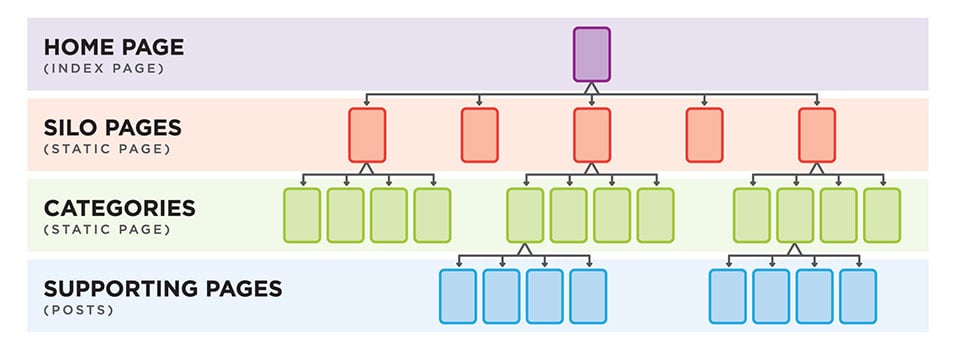
Source: https://linkdelta.com/seo-website-silo-architecture/
Topic Clusters
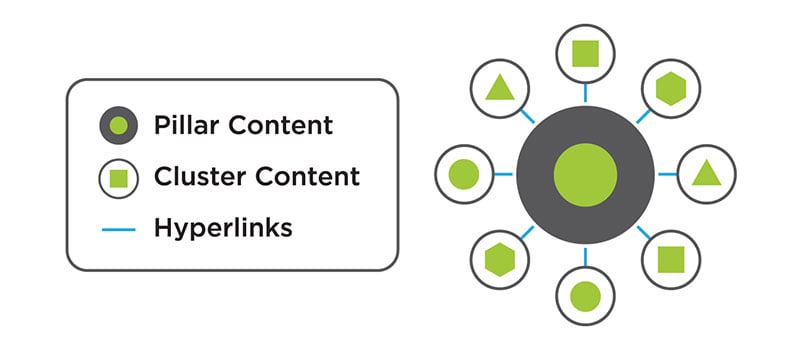
The easiest way to think about these structures is to picture an E-commerce website, such as Amazon.com. The sub-pages are organized into primary categories or “Departments” and sub-categories. For example, you’ll see clothing as a primary category, which then breaks down logically into Women's >> Coats >> Vests.
Your website should be organized in a similar manner, where your top keywords are organized as primary “departments” with several sub-pages to support the topic. Here’s how to optimize your website:
Step 1. Choose the best hierarchy for your website using logic, common sense, and keyword research.
Step 2. Make sure your URLs reflect your hierarchy. For example: https://your-domain.com/keyword-hub/optimized-keyword-sub-page/
Step 3. Add hyperlinks from your hubs to your sub-pages and then from your sub-pages back to your hubs.
Having trouble visualizing it? Here's what it looks like now:
Topic: Instagram Marketing
Pillar Content: Instagram Marketing
Cluster Content: The Anatomy of a Perfect Instagram Profile, How to Write Good Instagram Captions: 8 Bookmarkable Tips for Perfecting Your Copy, How to Use Instagram Stories: A Simple Guide for Marketers
Recommended reading on this topic:
- https://blog.kissmetrics.com/site-structure-enhance-seo/
- https://research.hubspot.com/topic-clusters-seo
- http://www.canirank.com/blog/seo-silo/
- http://themezoom-neuroeconomics.com/SEO_Website_Silo_Architecture
- https://moz.com/blog/the-2-user-metrics-that-matter-for-seo
- https://blog.hubspot.com/blog/tabid/6307/bid/34195/how-to-design-a-site-structure-visitors-and-search-engines-love.asp
How do I optimize for Featured Snippets?
It is now possible to rank above the #1 organic listing on Google, and there are 16 different ways in which you can do this. If you’re not optimizing for Featured Snippets - you should start now because it will drive more traffic, boost brand visibility, and increase your trust and credibility by legitimizing your authority.
What are Featured Snippets? Here’s an example:
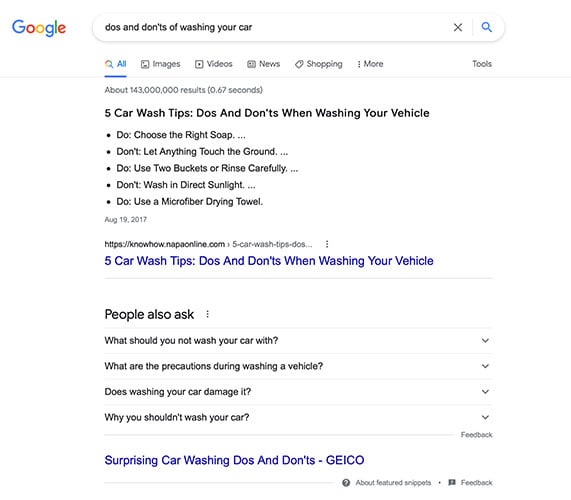
16 Features Every SEO Strategy Should Consider
Here’s a brief overview of all 16 types of Featured Snippets, including how-to descriptions plus links to learn more.
| SERP FEATURE TYPE | HOW TO GET IN |
|---|---|
| Video Units | Create & optimize on YouTube (or rarely, Vimeo) |
| "People Also Ask" | Branding - get searched for with/after the query |
| Featured Snippet | Phrasing & position of short answer in content |
| Maps Box | Claim GMB, get links, earn citations, be nearby |
| Knowledge Panel | Earn brand association, use structured makeup |
| Top Stories (News) | Get in Google News, earn links, title w/ KWs |
| Images | Relevant images, alt attributes, & direct embeds |
| Apps | KWs in the title/description, get popular in app stores |
| Books | Write a book, use KWs in the title, have an ISBN |
| Related Searches | Be searched & found commonly w/ the KWs |
| Tweets | Verified accounts help, use KWs in tweets |
| Search Suggest | As with related searches, also geo-sensitive |
| Sitelinks | Get links & visits to several pop pages, use markup |
| Section Sitelinks | Grow popular subsections with popular subpages |
| In-Depth Articles | Author longer pieces that receive attention/links |
| Carousels/Link Results | Be listed alongside common sets on the web |
Video Units
Video units are snippets that show a video in the Search Results. Over 90% of the time these appear, that video is hosted on YouTube.
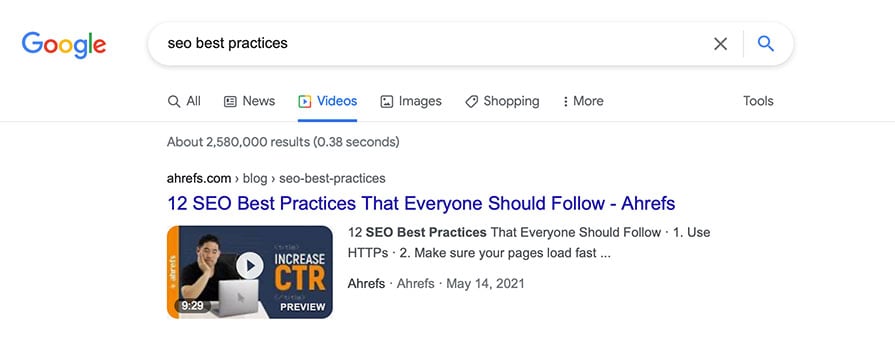
(source: https://builtvisible.com/micro-data-schema-org-guide-generating-rich-snippets/#video)
“As of now, If you have an SEO strategy that doesn't include YouTube, you're doing it wrong. “
- Phil Nottingham, July 2014 (source: https://moz.com/blog/video-seo-post-rich-snippets)
And now, here’s Phil to explain. Watch this video: https://fast.wistia.net/embed/iframe/xywc2s38dc?videoFoam=true
Video, honestly is one of the most expensive forms of SEO. And learning how to do it is very complex. However, eventually - there is a payoff if you do it right. But be sure to calculate the ROI to see if it’s worth it.
“People Also Ask” Box:
Questions that begin with “what,” “how,” and “is” occur most frequently in the People Also Ask Box. Step 1. Create your question and insert as the Page Title starting with “what,” “how,” or “is”. Step 2. Insert your keyword as non-question statement and insert it into your H1 tag. For example, if your target keyword is “healthy diet ideas”. Put your “natural language” question in the Page Title (“How to have a balanced diet?”) and repeat a similar, phrase in your H1 Tag (“Eating a balanced diet”)
Easy! Now, all you need to figure out is which questions your audience will ask?
One easy way to find these types of searches is to go to the Google search box and type a question your target audience members would enter. You’ll see some ideas pop up. Any one of those can be excellent topics for your content that’s more likely to rank in the snippets:
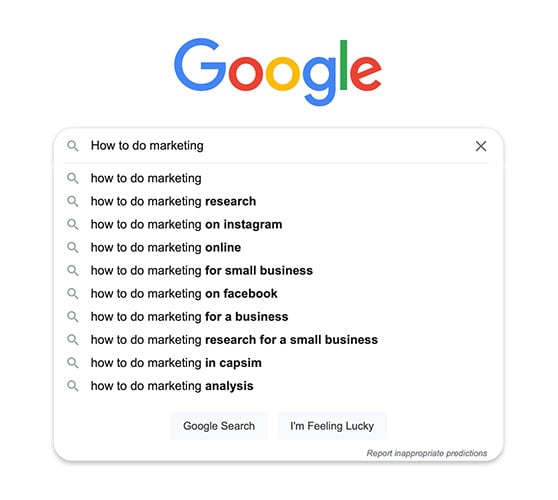
Pro Tip:
Create an FAQ section on your website to house all of the Question and Answer pages you create as part of this strategy.
Featured Snippet:
Here’s how you can get a Google featured snippet
Starting to optimize your content for featured snippets, or reworking previous content to get a snippet, requires a few formatting techniques.
Formatting
Formatting your featured snippets should take into account:
- Text
- Tables
- Numbered lists
- Bullet points
- Steps
- Charts
- Images
Word Count
Making your steps, numbered and bulleted lists, or paragraphs concise and tight may make it easier for algorithms to determine whether your content is fit for the feature.
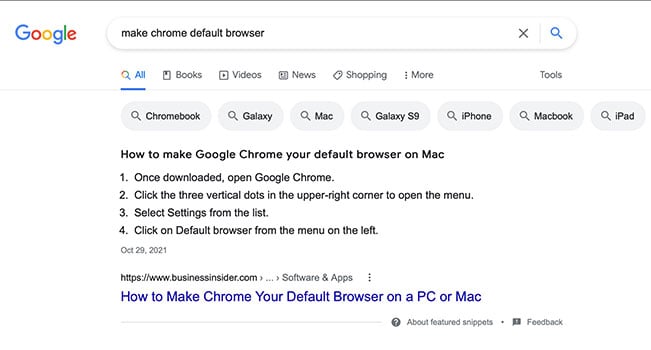 (source: https://searchenginewatch.com/2017/06/15/how-to-optimize-for-googles-featured-snippets/)
(source: https://searchenginewatch.com/2017/06/15/how-to-optimize-for-googles-featured-snippets/)
You want to optimize to the tune of Google’s algorithms, and research has found that word count makes a big difference. “The most common length of content in Featured Snippets is between 40-50 words,” according to an analysis by SEMrush.
Pro Tip: In every page you write, include images, paragraph tags, bulleted lists, and format them concisely.
Maps Box:
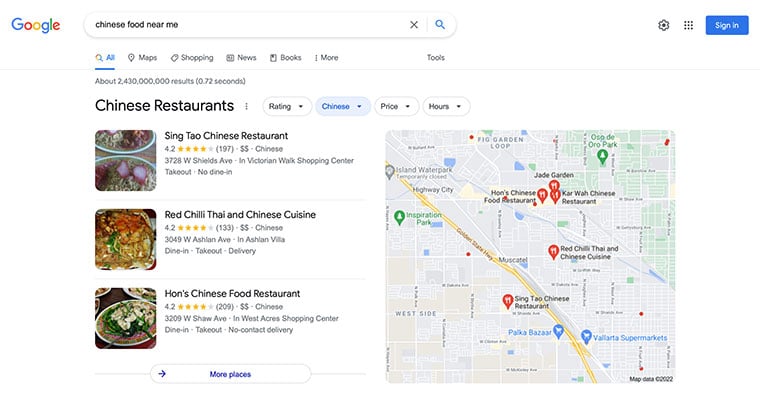
The first and most crucial step to appearing in the Maps box is to claim your Google MyBusiness profile at https://business.google.com. You stand little to no chance of appearing in the maps box without this account. Be as thorough as you can when adding in your business’s info, including adding your business categories, hours, website, accessibility, and photos.
Other important factors in addition to overall SEO practices:
- Proximity to searcher. As you can see in the screenshot, the first results that came up in the maps are the results closest to my location.
- Citations from local authorities and/or “Internet Yellow Pages”. An example would be a local news agency mentioning your business in one of the following formats:
- Company name.
- Company name & phone number.
- Company name, phone number, & address.
- Company name, phone number, address, & website.
- Company name, & website.
- Company phone number.
- And so on.
There are many factors that go into this, and your business need not always be linked to for these references to affect the search results, but the more complete the reference to your business, the better. Also note that “Internet Yellow Pages” refers to any website which lists business names and contact information in an organized fashion. So be sure to set up and complete your profiles on as many local listing services, such as Yelp, Foursquare, Yahoo Local, etc. as are applicable to your business.
Pro Tip: Claim those business profiles!
Knowledge Panel:
Claim your brand so
Step 1. Follow the instructions from Google on adding structured markup to your site. The code snippet will look something like this:
<script type="application/ld+json">
{ "@context" : "http://schema.org",
"@type" : "Person",
"name" : "your name",
"url" : "http://www.your-site.com",
"sameAs" : [ "http://www.facebook.com/your-profile",
"http://instagram.com/yourProfile",
"http://www.linkedin.com/in/yourprofile",
"http://plus.google.com/your_profile"]
}
</script> Step 2. Test your markup using Google's Structured Data Testing Tool. Select the “code snippet” tab and paste your code into the box. Click the “Run Test” button and verify that you have 0 errors and 0 warnings.
Step 3. You’ll need to copy the code snippet and paste it somewhere in your HTML body tags. Pro Tip: If using Yoast, this code will be automatically inserted for you when you enter in your social media accounts in Yoast’s settings.
Pro Tip: If using Yoast, this code will be automatically inserted for you when you enter in your social media accounts in Yoast’s settings.
Top Stories (News):
To optimize your website for Top Stories (formerly called “In The News..”) You’ll need to include the NewsArticle structured data from schema.org Here’s an example. https://schema.org/NewsArticle (scroll to bottom of page)
Additionally, there are some meta tags you should include:
Mainly, they are the news_keywords meta tag, and the standout meta tag.
<meta name=”news_keywords” content=”Keyword, Keyword, Keyword”>
<meta name=”standout” content=”http://www.YourSite.com/breaking_exclusive_story″/>
For more information, read this article: https://placementseo.com/guide-google-meta-tags-seo/
Images
In some cases, an image will appear as a featured snippet. To optimize your website for images You’ll need to include the “image ” structured data from schema.org Here’s an example. https://schema.org/image (scroll to bottom of page)
Here are some more tips on how to optimize images for the web:
- Name your images descriptively and in plain language.
- Optimize your alt attributes carefully.
- Choose your image dimensions and product angles wisely.
- Reduce the file size of your images.
- Choose the right file type.
- Optimize your thumbnails.
- Use image sitemaps.
- Beware of decorative images.
- Use caution when using content delivery networks (CDNs).
- Test your images.
Apps
App Store Optimization, or ASO takes place in The App Store or Google Play mobile app marketplaces. If you have a popular mobile app that you would like to appear in the Google Search results as a featured snippet, there are some things you can do to optimize your App Store profile. Here’s The App Store Optimization Checklist: Top 10 TipsBooks
As previously mentioned, if you have written a book, and would like it to appear in Google Search results, there are some things you can do to optimize your website.
Step 1. Use keywords in the title tag, such as the book title or relevant keywords.
Step 2. Make sure you have an ISBN.
Step 3. Insert your structured data into your code. We recommend using the JSON-LD format. Here’s an example code snippet from http://schema.org/Book
<script type="application/ld+json">{"@context":"http://schema.org","@graph": [ { "@id": "https://laurentian.concat.ca/eg/opac/library/MRC", "@type": "Library", "name": "Music Resource Centre" }, { "@id": "https://laurentian.concat.ca/eg/opac/record/2845929#schemarecord", "@type": "Movie", "additionalType": "Product", "about": [ "Composers > Austria > Biography.", "Haydn, Joseph, 1732-1809.", "Documentary films." ], "datePublished": "[2011]", "name": "In search of Haydn [videorecording] / Phil Grabsky Films.com & Seventh Art Productions in association with Sky Art HD ; filmed, written and directed by Phil Grabsky.", "offers": { "@type": "Offer", "availability": "http://schema.org/InStock", "businessFunction": "http://purl.org/goodrelations/v1#LeaseOut", "availableAtOrFrom": "Circulation", "price": "0.00", "seller": { "@id": "https://laurentian.concat.ca/eg/opac/library/MRC" }, "serialNumber": "30007008812793", "sku": "ML 410 H4 I5 2011" }, "publisher": { "@type": "Organization", "location": "[Brighton, UK] :", "name": "Seventh Art Productions," } }]}</script>
Paste your code snippet in between your <body></body> tags on your website.
Related Searches
Related searches show up at the bottom of the Google search page. For example, I searched for “best seo company” and these were the related searches that showed up:
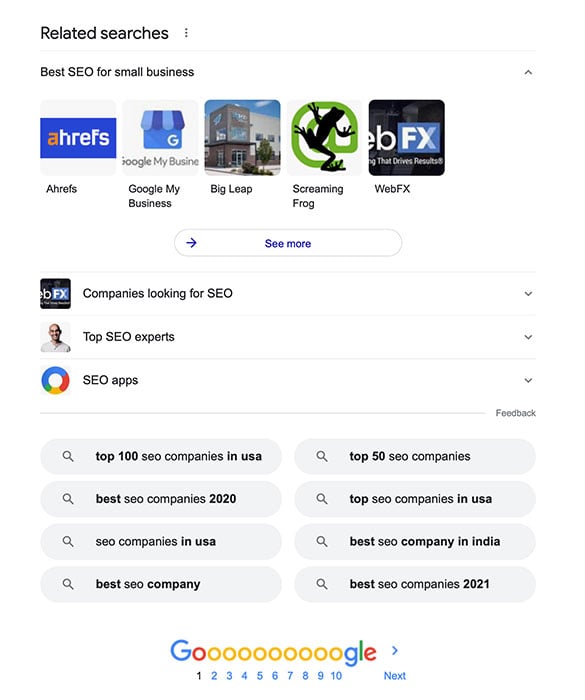
Google says that related searches are the terms that Google searched for with the term you entered (or overall, if no keyword was entered), which had the most significant growth in volume in the requested time period.
- The key to showing up in those related searches is creating more specific content related to those search terms. If you create great content that relates to those search terms, it’s more likely that you’ll appear in the Google related searches.
- For “best seo company” you might write content about the “best local seo company” since Google takes into account your location
- As Moz explains it, if you are a chemical company looking for “chemical safety goggles” you may type that in and might find what you’re looking for. But if you’re looking for a specific brand, then you might type “3M chemical safety goggles”. If you provide that brand of chemical safety goggles, then it’s a lot easier to rank for that keyword search than the generic “chemical safety goggles”. Over time, as more people search for “3M chemical safety goggles”, it affects search suggest.
Tweets
Do you want your active and engaging Twitter account to appear in Google Searches? As an example, if you query: Star Wars, the Star Wars Twitter account appears near the top of the results.
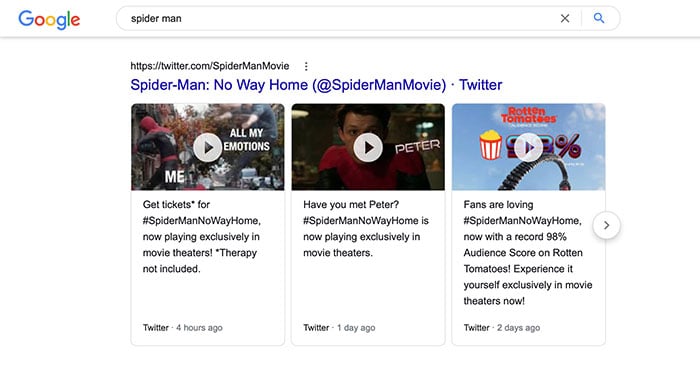
This type of snippet applies if you have at least 1000 twitter followers, and appeal to an international market. Though, it’s better if you have over a million followers. The more verified accounts you have as followers, the better.
If that’s you, follow this link for instructions and code snippet examples.
Search Suggest
Search suggest is when you are typing a phrase or keyword into Google and suggestions show up below it. Sometimes you use them, sometimes you don’t. Search suggest has a similar strategy as related searches.
Factors for Search Suggestions
- Query volume - Similar to how Google comes up with it’s related searches, search suggestions show up based on how many people are searching for specific keywords or phrases
- Location - Different search suggestions show up in different areas. For example, maybe you want to know if there are any festivals happening in your town or city so you type in “festival” and these search suggestions show up:
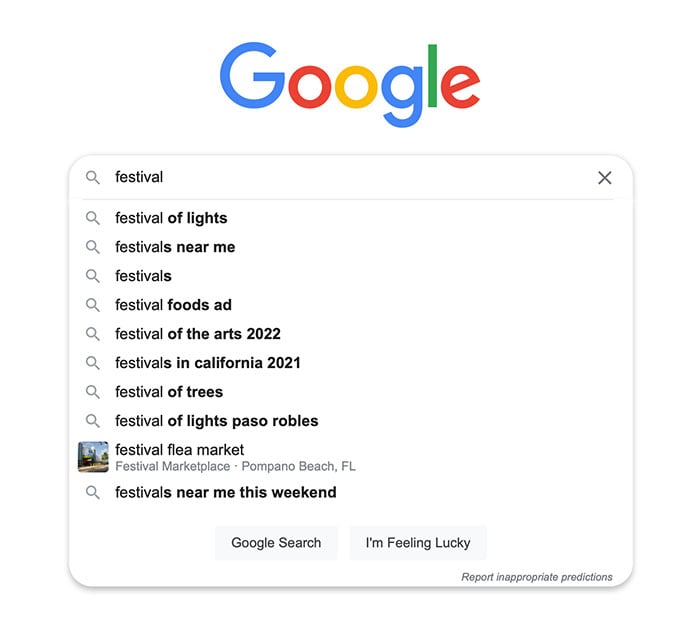
- Google knows that you’re in California, so it puts that as the first option, and further down in the list, you’ll see “festivals in Fresno” since it knows you’re in Fresno, it gives you the option of searching for that
Sitelinks Search Box
When a user searches within that search bar, they will only get results from Moz, increasing their site traffic. How to Add Sitelinks to your Web Search Results
- See if your site qualifies - not all sites qualify for this. Ask these questions to find out.
- Does your site get a lot of branded or navigational search traffic? - If the search volume is good, then it’s a good indicator that you may qualify
- Did you receive a message from Google Webmasters Tool? - If you qualify, Google Webmasters Tool would have sent you an email to make your site ready for the new sitelinks search box
- Do you already see a sitelinks search box when you see Google search results from your website? - Do a Google search for the most common branded or navigational search terms that your visitors might use. If you see a sitelinks search box, then it’s likely you qualify.
- Get your own internal search engine - You can get a free Google Custom Search engine.
- Add SearchAction Schema to your homepage - Place the following snippet in the source code of your homepage, editing the "url" and "target" fields to match your website information.
<script type="application/ld+json">
{
"@context": "http://schema.org",
"@type": "WebSite",
"url": "https://www.example-petstore.com/",
"potentialAction": {
"@type": "SearchAction",
"target": "https://query.example-petstore.com/search?q={search_term_string}",
"query-input": "required name=search_term_string"
}
}
</script>
Section Sitelinks
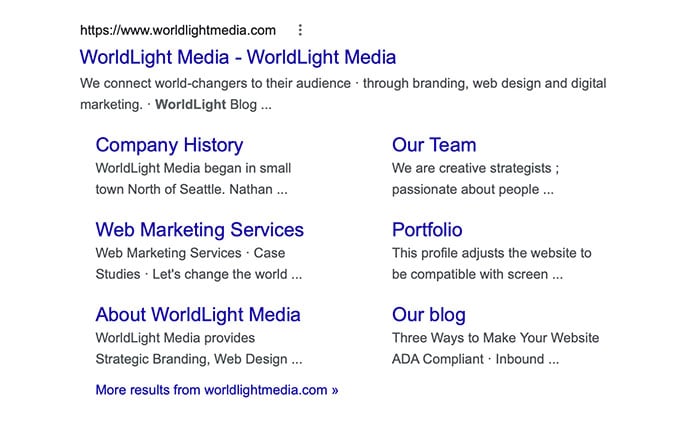
Section sitelinks are the links that show below the header link in a Google search result. Google decides whether or not to feature section sitelinks and which ones it displays (unless it’s on an ad, then you can choose). If you’re not satisfied with the links it’s chosen, create a sitemap for your website, then optimize the content you want to show up. Google may catch on and change them.
In-Depth Articles
In-depth articles are those intended for content that will be relevant months or even years in the future, such as scholarly articles or news articles with comprehensive coverage of an event or incident. In-depth articles only show up for very broad terms, and lately seems to be getting phased out in favor of the “Top Stories” feature. If your website features comprehensive content that you feel would be a good fit for the “In-Depth” articles feature, then it you will want to add aspects of the schema.org Article markup. For In-Depth articles, Google appears to primarily look for the following: notably the following attributes:
- headline
- alternativeHeadline
- image (note: the image must be crawlable and indexable)
- description
- datePublished
- articleBody
Carousels/Link Results
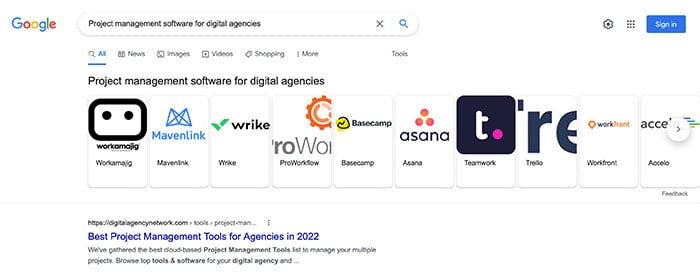
Very little is known about these Carousels, from when or why they appear, to how to be included on them. They only appear for very broad search terms, most examples being related to software, apps, or lists of websites. It is currently thought that the results are based on Alexa rankings. Clicking on a carousel item brings you to a Google search page for that term, rather than the official website.
Recommended reading on this topic:
How to Optimize for Google's Featured Snippets to Build More Traffic
How to optimize for Google’s featured snippets
Earlier this year, Google published one of the most comprehensive explanations yet of their featured snippets in a post on the search blog. If you want to read even more about featured snippets - look no further than Google’s own blog.
Ultimate SEO To-Do List
Tips for Ranking in Google in 2022:- Solve the searcher’s task better than anyone else on page one (focus on searcher intent!)
- Technical accessibility (don’t hamper the bots from crawling your site!)
- Keyword research (talk to searchers the way they search)
- Intelligent keyword & relevant topic in use (use natural language, not spammy keyword jargon)
- Load fast and responsive on every device at every speed (choose the right host and build your site with clean code!)
- Target the right featured snippets in the right queries
- Earn more and better editorial links than your competition (here’s how!)
How to get Backlinks:
- Prospecting - Find Opportunities
- Guest Posting: contribute content to someone else’s site in order to get a link back to your website.
- Find websites in your industry
- “Guest post by” intitle:fitness
- Filter by the ones that accept guest bloggers
- Use a tool such as ahrefs or SEMrush to get insights into metrics such as:
- Domain Rating
- Backlinks
- Search Traffic
- Keywords
- Broken Link Building
- Unlinked Mentions
- Find Emails
- Outreach
- Tracking
Recommended Tools The Pros Use
Basic Tools
Google Analytics
Google Webmaster Tools
WordPress-Specific:
Yoast SEO Plugin:
Keyword Research Tools
Google.com
https://trends.google.com/trends/
SEO Reference Tools
All 200 Google Ranking Factors → followed by The Myth of Google's 200 Ranking Factors
2017 Local Search Ranking Factors
Learn how to optimize your website
The Search Engine Land Guide to SEO
Have a Link-Building Strategy in Place
Migration Tools
The Website Migration Guide: SEO Strategy, Process, & Checklist
Paid SEO Tools
https://seranking.com/ - This is the tool we use for SER tracking and website audits.






